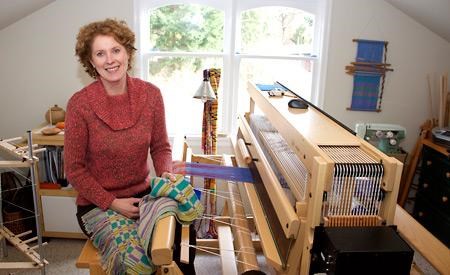Neither Sharon Simpson nor her partner Bob Allen had any idea that the simple act of buying some sheep would spark an interest which would keep Simpson connected to her creativity over the next two decades.
The Powell River couple owns acreage in Paradise Valley which is rented out, but at the time of purchase Simpson and Allen thought it made sense to use some of the space to raise chickens and sheep.
“We didn’t know anything about farming,” said Simpson, sitting down in her living room to explain how she became a fibre artist.
“I don’t eat beef,” she said, “but I like lamb and I thought that I could always eat my mistakes if need be.”
She had knitted in the past and thought that it would be interesting to create her own yarn, but she did not know how to produce it.
Then what started as a simple idea soon started piling up as a growing concern. “After a while I had amassed a huge amount of wool,” she said.
So she approached Powell River Fine Arts Association with a proposition.
Simpson explained to the group that she had this large amount of wool that needed to be spun and that she would be willing to donate much of it if someone in the association could spin it.
“They graciously invited me to come up to the fine arts [building] to teach me how to do it myself,” Simpson said, adding that she had always thought of herself as being in touch with her creativity.
Later she realized why.
“It’s very therapeutic and the motion of the foot pedals is relaxing, but it’s extremely time-consuming,” she said.
For the next few years, Simpson spent a large amount of her free time spinning yarn and helping out around the association.
While most community art groups have neither their own studio space, having to meet in schools, churches or community centres, nor looms or spinning wheels available for learning the fundamentals of fibre art, Powell River has both, said Simpson. “For the price of membership, you can learn it all. That’s how I got started.”
It did not take her long to graduate from spinning thread to learning the techniques of weaving it. Now, she doesn’t spin wool anymore, preferring to purchase cones of finer threads to work with.
Beginners to weaving usually start out on two or four harness looms as they are slightly less complicated to set up. And some weavers who have been at it for many years have stuck with the simpler looms because they are still able to do new designs, even complex ones, with the smaller looms.
Simpson creates a wide range of woven fabrics and items including tea towels, multi-layer moebius scarves and shawls. Though the idea of weaving fabric to create articles of clothing has not really appealed to her in the past, she said she is now thinking about making “a really good coat.” She said she does not weave in order to sell items, though she has sold a few items to friends.
Simpson has had a number of looms over the years, the machinery necessary to maintain a correct tension to weave fabric, but she currently has two from Dutch manufacturer Louët: a four-harness portable that she takes to workshops when she can and the other a 16-harness computer-assisted one, possibly the only one in Powell River.
Computer-assisted looms do not actually do the weaving for you, Simpson said. What they do is allow for more complex looms to be smaller in size and weight, which makes them easier to operate. They also give the user the added ability to use software to design patterns and show what they will look like before the weaver engages in the time-consuming process of weaving them.
As a world traveller, learning weaving has brought another dimension to her appreciation for foreign cultures. “Then you get into the history of it,” she added. “Women for centuries have been weaving.”
She said weavers in South and Central America use simple backstrap looms to produce remarkably complex and high-quality weavings, having no need for computers to help them with their designs.
Weaving has its appeal because there is always something new and challenging to learn, Simpson added. “You end up down this road that you’d never thought you’d be when you first got some sheep.”
Powell River is hosting a retreat for fibre artists from Vancouver Island, the Sunshine Coast and the Lower Mainland at the end of the month and Simpson is helping to organize the event.
It is the annual Vancouver Island Spinners and Weavers retreat and is being called Powell River Fibre Fest 2015.
It will be a weekend of workshops for weavers, spinners, dyers, felters, knitters and anyone else who thinks they might be interested in learning more about the wide range of activities associated with fibre arts.
The retreat is being held at the Beach Garden Resort and Marina and Simpson said organizers expect close to 100 participants. The event is a mix between social and learning opportunities.
In addition to the wide range of workshops during the event, Oregon weaver Rosalie Neilson, who travels around the world delivering workshops, will present a two-day pre-retreat workshop called, “It’s in the Warp: Colour and Design in Warp-faced Rep.” That’s happening from 9 am to 4 pm on Thursday and Friday, March 26 and 27, at Powell River Fine Arts Association (5395 Timberlane Road).
For more information about the workshops, readers are encouraged to contact Simpson at 604.485.3009 or visit the event’s website.



